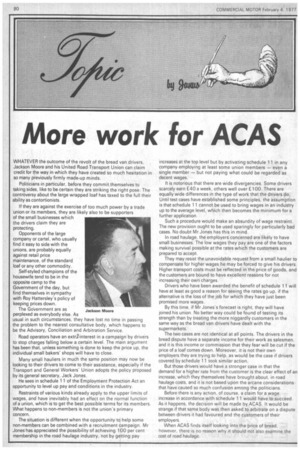More work for ACAS
Page 82

If you've noticed an error in this article please click here to report it so we can fix it.
WHATEVER the outcome of the revolt of the bread van drivers, Jackson Moore and his United Road Transport Union can claim credit for the way in which they have created so much hesitation in so many previously firmly made-up minds.
Politicians in particular, before they commit themselves to taking sides, like to be certain they are striking the right pose. The controversy about the large wrapped loaf has taxed to the full their ability as contortionists.
If they are against the exercise of too much power by a trade union or its members, they are likely also to be supporters of the small businesses which the drivers claim they are protecting.
Opponents of the large company or cartel, who usually find it easy to side with the unions, are probably equally against retail price maintenance, of the standard loaf or any other commodity.
Self-styled champions of the housewife tend to be in the opposite camp to the Government of the day, but find themselves in sympathy with Roy Hattersley's policy of keeping prices down.
The Government are as perplexed as everybody else. As usual in such circumstances, they have lost no time in passing the problem to the nearest consultative body, which happens to be the Advisory, Conciliation and Arbitration Service_ Road operators have an extrlinterest in a campaign by drivers to stop charges falling below a certain level. The main argument has been that, unless something is done to keep the price up, the individual small bakers' shops will have to close.
Many small hauliers in much the same position may now be looking to their drivers to come to their assistance, especially if the Transport and General Workers' Union adopts the policy proposed by its general secretary, Jack Jones.
He sees in schedule 11 of the Employment Protection Act an opportunity to level up pay and conditions in the industry.
Restraints of various kinds already apply to the upper limits of wages, and have inevitably had an effect on the normal function of a union, which is to get the best possible terms for its members. What happens to non-members is not the union's primary concern.
The situation is different when the opportunity to help some non-members can be combined with a recruitment Oam paign. Mr Jones has appreciated the possibility of achieving 1p0 per cent membership in the road haulage industry, not by getting pay
Jackson Moore
increases at the top level but by activating schedule 11 in any company employing at least some union members — even a single member — but not paying what could be regarded as decent wages.
It is notorious that there are wide divergencies. Some drivers scarcely earn £40 a week, others well over £100. There are equally wide differences in the type of work that the drivers do. Until test cases have established some principles, the assumption is that schedule 11 cannot be used to bring wages in an industry up to the average level, which then becomes the minimum for a further application.
Such a procedure would make an absurdity of wage restraint. The new provision ought to be used sparingly for particularly bad cases. No doubt Mr Jones has this in mind.
In road haulage, the employers concerned are likely to have small businesses. The low wages they pay are one of the factors making survival possible at the rates which the customers are prepared to accept.
They may resist the unavoidable request from a small haulier to compensate for higher wages he may be forced to give his drivers. Higher transport costs must be reflected in the price of goods, and the customers are bound to have excellent reasons for not increasing their own charges.
Drivers who have been awarded the benefit of schedule 11 will have at least as good a reason for seeing the rates go up, if the alternative is the loss of the job for which they have just been promised more wages.
By this time, if Mr Jones's forecast is right, they will have joined his union. No better way could be found of testing its strength than by treating the more niggardly customers in the same way as the bread van drivers have dealt with the supermarkets.
The two cases are not identical at all points. The drivers in the bread dispute have a separate income for their work as salesmen, and it is this income or commission that they fear will be cut if the price of a loaf comes down. Moreover, it is not their own employers they are trying to help, as would be the case if drivers covered by schedule 11 took similar action.
But those drivers would have a stronger case in that the demand for a higher rate from the customer is the clear effect of an increase, which they themselves have brought about, in road haulage costs, and it is not based upon the arcane considerations that have caused so much confusion among the politicians.
Before there is any action, of course, a claim for a wage increase in accordance with schedule 11 would have to succeed. As it happens, the decision will be made by ACAS It would be strange if that same body was then asked to arbitrate on a dispute between drivers it had favoured and the customers of their employers.
When ACAS finds itself looking into the price of bread, however, there is no reason why it should not also examine the cost of road haulage.
































































































































